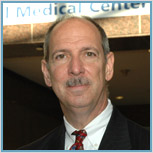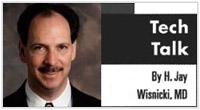 |
||||
|
||||
|
The Internet is altering the doctor-patient relationship
An interview with Peter Neupert, president and chief executive officer of drugstore.comBy H. Jay Wisnicki, MD Published in Ophthalmology Times Internet technology is irrevocably altering the relationships healthcare providers have with their patients, a reality with profound implications for the practice of medicine, says Peter Neupert, president and chief executive officer of drugstore.com. In an exclusive, wideranging interview with Ophthalmology Times, Neupert, a former senior Microsoft executive, discussed the short and longterm implications the Internet has on physicians, thirdparty payers, and consumers. "The Web," he said, "is the empowering medium to allow people to get informed to whatever level they want. It's not a replacement for the professional knowledge of the doctor. It's a supplement to getting the patient up to a level of speed where one can have the right conversation between the patient and the doctor." As a result, Neupert said, doctors will turn to the Web "to learn more about what's going on and figure how they can use it in their practice to make it better." Founded in February, drugstore.com offers more than 16,000 brandname personal healthcare products and a licensed pharmacy online 24 hours a day, 7 days a week. Consumers can review indepth product information, set up personal shopping lists, email reminders for replenishing regularly used products, and have private email access to pharmacists and others for questions. Before joining drugstore.com, Neupert was vice president of news and publishing for Microsoft's Interactive Media Group, with responsibility for developing media business partnerships for MSNBC. He also was director of strategic partnerships for Microsoft's Consumer Technology Group, managing a broad variety of business and marketing relationships to foster the "information highway." For starters, Neupert said, physicians should use the Internet as a means of communicating with their "stake holders" in ways that make their lives easier. They also should acknowledge it as a prodigious source of information. Near term, he said, the Internet's biggest impact will be on "back office" communications. For example, prescriptions will likely be written on wireless PDAs, or Personal Digital Assistants, a medium that will link physician, payer, patient, and pharmacist to eliminate time and waste. He said there is enormous waste in today's "prescriptiondispensing system" as a result of "what gets written on a pad to the corporate system and back to the patients and the payer," he said. "Probably the next main thing that is going to change practices are these wireless devices. I think the benefits are so big that some institution will subsidize putting them into the hands of doctors in order to capture those benefits," Neupert said. Eventually, Neupert said, the Internet will affect such "front office" communications as outpatient schedules and outpatient early indications. Thus, one day a patient's vital information such as insurance data "will all get stored on some card that can get read and updated," he said, thus "reducing that drudgery and the risk of miscommunication." "I think Internet technology has caused a number of significant changes to the way physicians practice medicine, starting in the back office, moving through all the way to how people schedule appointments," Neupert said. He discounted issues of privacy, saying it will be no different from if someone tries to gain access to a person's credit information. The government, Neupert said, can add constraints, if necessary. "Certain people will obsess on privacy, if they don't see any benefit," he said, adding that he thinks the benefit to users will be so overwhelming that it won't be an issue. Service Neupert also discussed the potential impact technology may have on service, often overlooked in healthcare because patients rarely choose providers based on it. In his opinion, the practice of medicine "is still very much a fragmented business when you think about it as an industry structure." Large organizations will adopt technology faster than solo practitioners or small group practices, Neupert said, adding, "they may find ways that actually improve customer service." However, he cautioned against using technology to reduce patient choice or lock in preferred providers. Rather, the goal should be to increase convenience, choice, and flexibility for the patient. Physicians have been slow to adopt this new technology, Neupert said, but he believes this reticence can be overcome quickly. "You have to make sure technology is helpful in solving real problemsin a doctor's office, or in a back office, or, in this case, solving real problems for customers," he said. He said more people will adopt new technology once there are better solutions. Since patients increasingly are learning about doctors' risk profile from the Internet, Neupert said, those doctors are tapping into the medium to figure out how they can use it in their practice "to make it better." He said the medical information available on the Web is overwhelming, and not consistently accurate. Thus, he predicts, the equivalent of a continually "self-correcting" Good Housekeeping Seal of Approval will eventually take hold. Drugstore.com is intent on cracking the $150 billion health, beauty, and wellness market, Neupert said, by quickly building "a competent, compelling shopping experience on the Web." The company has a diverse team of pharmacists, technicians, merchandisers, and marketers. "Our biggest challenge," Neupert said, "will be fitting into the industry framework that exists in HMOs, managed care organizations, and pharmacy benefits companies that don't move at light speed and have existing prescription networks that don't know how to deal with the Internet now. "Their number one focus is not on the customer; it's on their business to business relationships and that can be an obstacle to a new business," he added. Neupert stressed that drugstore.com does not practice telemedicine. The company is "very cautious and clear about that distinction," he said. "That's not the business we're in. We're in the pharmacy business, making it easy for people to get their medications that have been prescribed to them by their physician." |
Copyright ©2006 H.J. Wisnicki, MD All Rights Reserved
